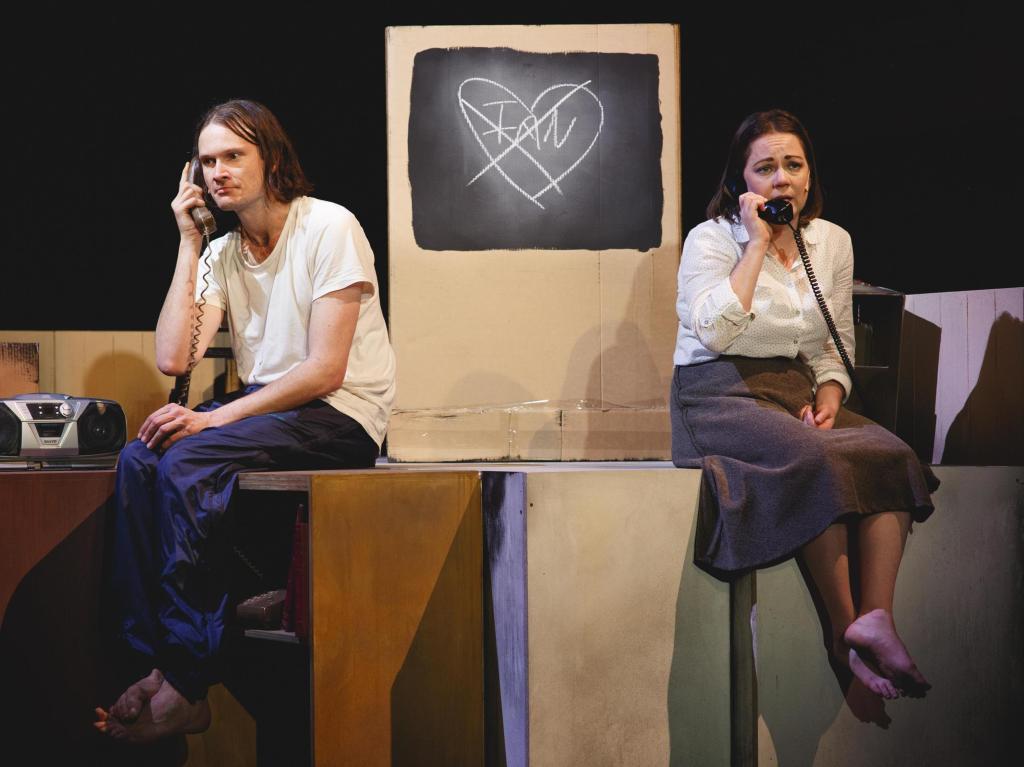Brendan Ewing and Natalie Holmwood in The Eisteddfod. Image by Daniel James Grant.
Orphaned in a tragic tree-pruning accident, teenaged siblings Abalone and Gerture withdraw from the world around them. While adult Gerture actively pursues a life of mediocrity, working as a school teacher and embarking on a relationship with the dismissive, possibly imaginary, Ian, Abalone aspires to greatness through winning the local eisteddfod, returning year after year to impress the judges. With a one-way ticket to Moscow as the prize on offer, he tempts Gerture home to perfect a performance together as Macbeth and Lady Macbeth.
As they shut themselves within Abalone’s mouldy kingdom, a shabby tribute to the tawdry domestic familiarity of their shared childhoods, Gerture mourns the failing of her relationship with Ian. As they prepare for their performance, the brother and sister act out and remember scenes of their parents’ disputes, consider their worldly ambitions and limitations and provide mutual support and criticism. Abalone’s genius at preparing for the eisteddfod crosses with his lack of adult socialisation, his one consuming passion simultaneously pushing him forward while holding him back. Throughout the unfolding events comes the disembodied voice of playwright Lally Katz, checking in with her characters and providing commentary on the drafting process of the play.
Director Jeffrey Jay Fowler pushes the resources at his disposal working with Black Swan State Theatre Company to create a discomforting and edgy portrayal of perverted domestic bliss and the destructive pursuit of dreams in a life vacuum. Fowler’s ‘appearance’ as the voice of Lally Katz adds to the surreal feeling of dream infusing The Eisteddfod, his compassionate and mellifluous tones interacting closely with proceedings but the male pitch and timbre confounding expectations.
Brendan Ewing as Abalone repels any possibility of audience sympathy or identification. Ewing’s occupation of the performing genius contrasts and yet is inextricably linked with his casual cruelty to his sister and unconsciously crass adolescent habits, his tactless truthtelling and his childish insistence on playing make believe in the most trivial situations. Abalone is a difficult character to watch, but Ewing’s dedication to this conundrum is compelling, and the combination is horrifyingly fascinating. While Gerture could possibly be played in a way eliciting sympathy, Natalie Holmwood eschews this temptation and her self-pitying loser in all aspects of life is nearly as repulsive as her brother. Her need for love and affirmation are universal, but her self-abasement tactics are beyond evoking pity, raising instead a sense of disgust. By encouraging Abalone to portray Ian in a Richard III manner, staged and yet so intimate, Gerture multiplies her own suffering, Holmwood matching Ewing in grim, ambiguous character development.
Lucy Birkinshaw’s lighting design works closely with the script and with Tyler Hill’s grimly mouldering set design. The bleakness of the characterisation and dialogue are matched by the stark contrast between the rich red eisteddfod stage curtains and the domestic decay in the family home, walls succumbing to damp, cardboard boxes in place of furniture and a dingy toilet in pride of place, centre stage. Gerture’s classroom is ambiguously situated and designed, a cubbyhouse cum workplace, either way an escape from Abalone’s ambitions, as sordid and petty as they are relentless.
Brett Smith’s sound design alternates between subtle notes, right on the edge of awareness, enhancing the feelings expressed and amplifying the uneasiness in the spectator, and bombastically cheesy love songs and classic symphonic selections that tie in with the narrative and its various twists.
A challenging work for performers and audience, Black Swan State Theatre Company produces an edgy take on a difficult story, pushing creatives and audience alike to a renewed appreciation of the possibilities of theatre.
Rating: 4 stars out of 5
The Eisteddfod
By Lally Katz
Director Jeffrey Jay Fowler
Set & Costume Designer Tyler Hill
Lighting Designer Lucy Birkinshaw
Sound Designer Brett Smith
Stage Manager Claudia Blagaich
Performed by Brendan Ewing and Natalie Holmwood
Studio Underground, State Theatre Centre of WA
22 June 2017 – 9 July 2017





